Abstract
This paper proposes a novel approach for the multidimensional knapsack problem (MDKP) using differential evolution. Firstly, the principle and the pseudo-code of binary differential evolution with hybrid encoding (HBDE) are presented. On the basis of the existing repair operator 2 (RO2), an improved repair operator 3 (RO3) for handling the infeasible solutions of MDKP is developed. Then, combine HBDE with RO3, an efficient algorithm (HBDE-RO3) for MDKP is proposed. Finally, the experiment results of the 138 well-known MDKP benchmarks show that RO3 is advantageous to deal with the infeasible solutions than RO2, and the proposed algorithm HBDE-RO3 has superior performance for solving MDKP than the state-of-the-art algorithms.




Similar content being viewed by others
References
Kellerer H, Pferschy U, Pisinger D (2004) Knapsack problems. Springer, Berlin
Fréville A (2004) The multidimensional 0–1 knapsack problem: an overview. Eur J Oper Res 155:1–21
Meier H, Christofides N, Salkin G (2001) Capital budgeting under uncertainty—an integrated approach using contingent claims analysis and integer programming. Oper Res 49:196–206
Shih W (1979) A branch and bound method for the multiconstraint zero-one knapsack problems. J Oper Res Soc 30:369–378
Beaujon G, Martin S, McDonald C (2001) Balancing and optimizing a portfolio of r&d projects. Naval Res Log 48:18–40
Wu C, Wang X, Lin J (2014) Optimizations in project scheduling: a state-of-art survey. In: Xu H, Wang X (eds) Optimization and control methods in industrial engineering and construction. Springer, Dordrecht, pp 161–177
Balev S, Yanev N, Fréville A, Andonov R (2008) A dynamic programming based reduction procedure for the multidimensional 0–1 knapsack problem. Eur J Oper Res 186:63–76
Puchinger J, Raidl G, Pferschy U (2010) The multidimensional knapsack problem: structure and algorithms. INFORMS J Comput 22:250–265
Li Vincent C, Liang Yun-Chia, Chang Huan-Fu (2012) Solving the multidimensional knapsack problems with generalized upper bound constraints by the adaptive memory projection method. Comput Oper Res 39:2111–2121
Motwani R, Raghavan P (1995) Randomized algorithms. Cambridge University Press, Cambridge
Ding-zhu Du, Ko Ker-I, Xiaodong Hu (2012) Design and analysis of approximation algorithms. Springer, Berlin
Chu P, Beasley J (1998) A genetic algorithm for the multidimensional knapsack problem. J Heuristics 4:63–86
Xue-Cai YU, ZHANG Tian-Wen (2008) An improved ant algorithm for multidimensional knapsack problem. Chin J Comput 31:810–819
Ling W, Sheng-yao W, Chen F (2011) A hybrid distribution estimation algorithm for solving multidimensional knapsack problem. Control Decis 26:1121–1125
Chih M, Lin CJ, Chern MS, Ouc TY (2014) Particle swarm optimization with time-varying acceleration coefficients for the multidimensional knapsack problem. Appl Math Model 38:1338–1350
Chih M (2015) Self-adaptive check and repair operator-based particle swarm optimization for the multidimensional knapsack problem. Appl Soft Comput 26:378–389
Wang L, long Zheng X, yao Wang S (2013) A novel binary fruit fly optimization algorithm for solving the multidimensional knapsack problem. Knowl Based Syst 48:17–23
Mak A, Amac R, Emgp F (2014) Improved binary artificial fish swarm algorithm for the 0–1 multidimensional knapsack problems. Swarm Evol Comput 14:66–75
Liu J, Wu C, Cao J, Wang X, Teo KL (2016) A binary differential search algorithm for the 0–1 multidimensional knapsack problem. Appl Math Model 40(23–24):9788–9805
Zhang X, Wu C, Li J, Wang X, Yang Z, Lee J-M, Jung K-H (2016) Binary artificial algae algorithm for multidimensional knapsack problems. Appl Soft Comput 43:583–595
Chih M (2018) Three pseudo-utility ratio-inspired particle swarm optimization with local search for multidimensional knapsack problem. Swarm Evol Comput 39:279–296
Storn R, Price K (1997) Differential evolutiona simple and efficient heuristic for global optimization over continuous spaces. J Glob Optim 11:341–359
He Y, Wang X, Kou Y (2007) A binary differential evolution algorithm with hybrid encoding. J Comput Res Dev 44:1476–1484
Zhu H, He Y, Wang X, Tsang E (2017) Discrete differential evolution for the discounted 0–1 knapsack problem. Int J Bio-inspired Comput 10:219–238
Qin AK, Huang VL, Suganthan PN (2009) Differential evolution algorithm with strategy adaptation for global numerical optimization. IEEE Trans Evol Comput 13:398–417
Das S, Abraham A, Chakraborty UK, Konar A (2009) Differential evolution using a neighborhood-basedmutation operator. IEEE Trans Evol Comput 13:526–553
Wang Y, Cai Z, Zhang Q (2011) Differential evolution with composite trial vector generation strategies and control parameters. IEEE Trans Evol Comput 15:55–66
Yu Y, Yao X, Zhou Z (2012) On the approximation ability of evolutionary optimization with application to minimum set cover. Artif Intell 180–181:20–33
Gottlieb J, Marchiori E, Rossi C (2002) Evolutionary algorithms for the satisifiability problem. Evol Comput 10:35–50
Runarsson TP, Yao X (2000) Stochastic ranking for constrained evolutionary optimization. IEEE Trans Evol Comput 4:284–294
Coello CA (2002) Theoretial and numerical constraint-handling techniques used with evolutionary algorithm—a survey of the state of art. Comput Methods Appl Mech Eng 191:1245–1287
Michalewicz Z, Schoenauer M (1996) Evolutionary algorithms for pararmeter optimization problems. Evol Comput 4:1–32
Beasley JE (2017) Orlib-operations research library. http://people.brunel.ac.uk/mastjjb/jeb/ orlib/mknapinfo.html
Karaboga D, Basturk B (2007) A powerful and efficient algorithm for numerical function optimization: artificial bee colony (ABC) algorithm. J Glob Optim 39:459–471
Tan Y, Zhu Y (2010) Fireworks algorithm for optimization. In: International conference in swarm intelligence, pp 355–364
Mirjalili S, Mirjalili SM, Lewis A (2014) Grey wolf optimizer. Adv Eng Softw 69:46–61
Haibin D, Fei Y (2017) Progresses in pigeon-inspired optimization algorithms. J Beijing Univ Technol (Nat Sci Ed) 43:1–7
He Y, Wang X, Zhao S, Zhang X (2018) The design and applications of discrete evolutionary algorithms based on encoding transformation. J Softw 9:2580–2594
Acknowledgements
This article was supported by National Natural Science Foundations of China (11471097), Scientific Research Project Program of Colleges and Universities in Hebei Province (ZD2016005), and Natural Science Foundation of Hebei Province (F2016403055),and Scientific and Technological Research Projects of Colleges and Universities in Hebei Province (QN2019075).
Author information
Authors and Affiliations
Corresponding authors
Additional information
Publisher's Note
Springer Nature remains neutral with regard to jurisdictional claims in published maps and institutional affiliations.
Rights and permissions
About this article
Cite this article
He, Y., Zhang, X., Li, W. et al. An efficient binary differential evolution algorithm for the multidimensional knapsack problem. Engineering with Computers 37, 745–761 (2021). https://doi.org/10.1007/s00366-019-00853-7
Received:
Accepted:
Published:
Issue Date:
DOI: https://doi.org/10.1007/s00366-019-00853-7




